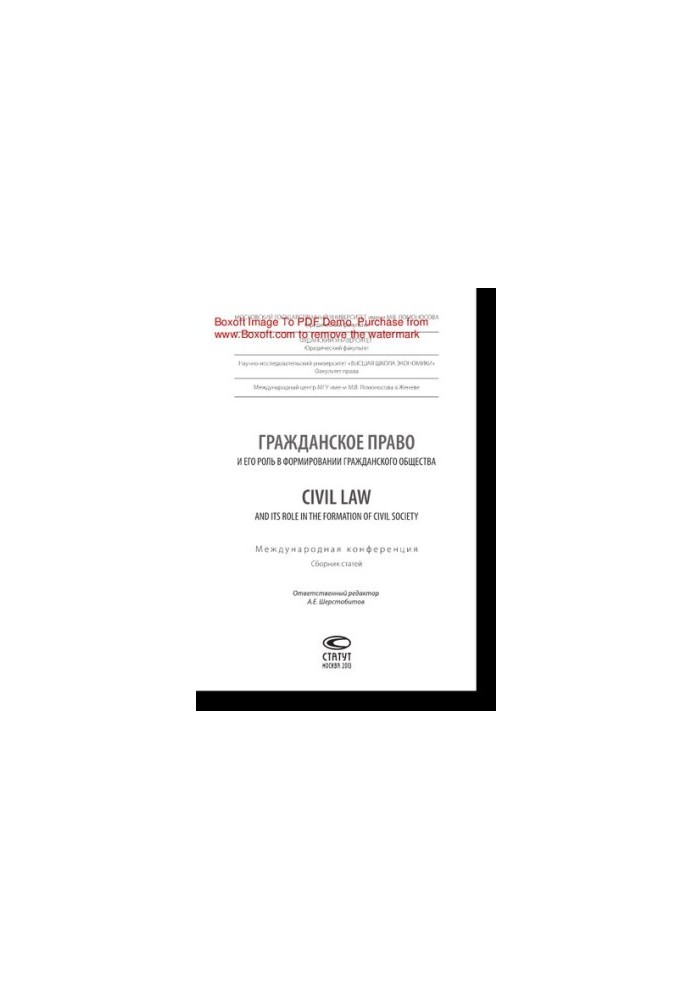Civil Law and its Role in the Formation of Civil Society.
 Instant download
Instant download
after payment (24/7)
 Wide range of formats
Wide range of formats
(for all gadgets)
 Full book
Full book
(including for Apple and Android)
The book "Civil law and its role in the formation of civil society" by Liu Shiguo, Ma Changshan, Cui Dianyuan, Yang Xinyu, Sukhanov E. A. , Erpileva N. Yu. , Chekhovskaya S. A. , Sherstobitov A. E. It is a deep and multifaceted study that immerses the reader in the world of civil law and its impact on the development of civil society. This work not only highlights the theoretical aspects of law, but also offers practical recommendations, making it valuable for both students and practicing lawyers. The book begins with an analysis of the fundamental concepts of civil law, its structure and functions. The authors, having a rich experience in the field of jurisprudence and social science, consider civil law as a key tool that contributes to the formation and strengthening of civil society. They emphasize that civil law is not just a set of norms and rules, but an important mechanism that ensures the protection of the rights and freedoms of citizens, promotes justice and social order. For whom will this book be interesting? First of all, it will be useful to law students, graduate students and everyone who is interested in law and its impact on social processes . It can also attract the attention of practicing lawyers, sociologists and political scientists who study the interaction of law and society. Readers interested in human rights, social justice and legal culture will find many useful ideas and concepts in this book. The topics raised in the book are diverse and relevant. The authors discuss how civil law can contribute to the development of civil activity, strengthen legal culture and increase the level of legal awareness in society. They consider the role of civil law in protecting the interests of individuals and groups, as well as in ensuring a balance between private and public interests. An important aspect is the analysis of modern challenges faced by civil law in the context of globalization and digitalization. The style of the authors is distinguished by clarity and accessibility, which makes it easy to perceive even the most complex ideas. They use many examples from practice, which makes the material more clear and understandable. This is especially important for readers who may not have an in-depth knowledge of the law, but seek to understand its significance in modern society. The book "Civil Law and its role in the formation of civil society" may also be of interest to those who study other works in the field of law and sociology. For example, readers familiar with the works of authors such as Ronald Dworkin or John Rawls will find in this study echoes of their ideas about justice and law. In addition, the book can be useful for those who are interested in legal regulation in different countries, as the authors draw on international experience and conduct a comparative analysis. Thus, this work not only enriches the reader's knowledge of civil law, but also inspires reflection on how law can serve as a basis for building a just and sustainable society. The book “Civil Law and Its Role in the Formation of Civil Society” is a must-read for anyone who wants a deeper understanding of how law and society are interconnected and how they can develop together.
LF/193024021/R
Data sheet
- Name of the Author
- Ерпылева Н.Ю.
Лю Шигуо
Ма Чаншань
Суханов Е.А.
Цуй Дианьюань
Чеховская С.А.
Шерстобитов А.Е.
Ян Синьюй - Language
- Russian
- Release date
- 2013























